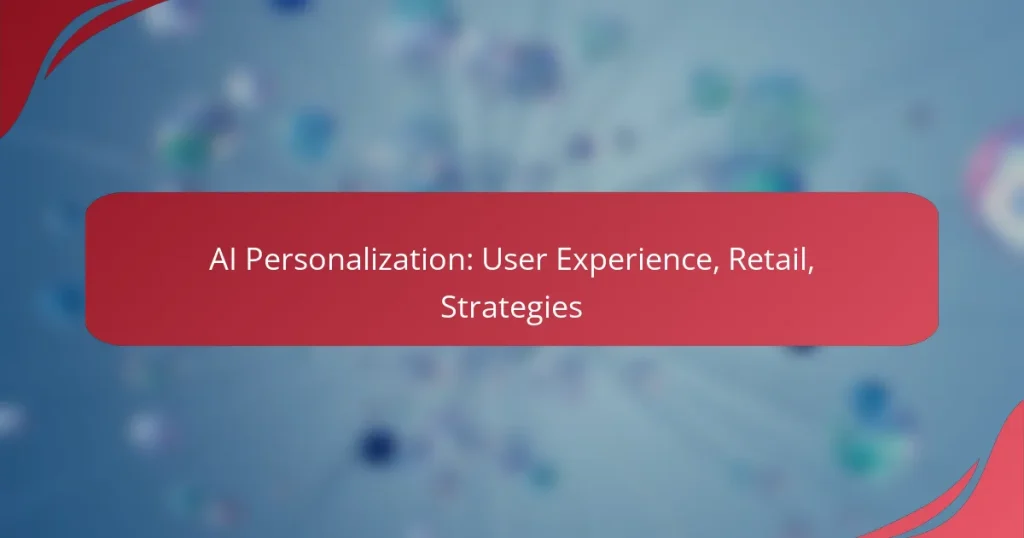AI-powered business solutions are revolutionizing customer experience by enabling personalized interactions and efficient support. By leveraging advanced technologies, businesses can streamline operations and make data-driven decisions that cater to customer needs. Implementing these solutions effectively requires a deep understanding of customer data and proper training for staff, ultimately leading to enhanced satisfaction and loyalty.
AI for Customer Retention: Techniques, Subscription Services, Strategies
AI Tools: Customer Engagement, Comparison, Business Fit
AI-Powered Personalization: B2B Marketing, Best Practices, Tools
AI Chatbots: Customer Service, E-commerce, Efficiency
AI Feedback Analysis: Customer Sentiment, Real-Time Insights
AI in Customer Behavior: Prediction, Small Business, Insights
How can AI enhance customer experience in e-commerce?
AI enhances customer experience in e-commerce by providing personalized interactions, efficient support, and data-driven insights. These technologies streamline processes, making shopping more intuitive and responsive to customer needs.
Personalized product recommendations
AI analyzes customer behavior and preferences to deliver tailored product suggestions. By utilizing algorithms that track browsing history, purchase patterns, and demographic data, e-commerce platforms can offer recommendations that resonate with individual shoppers.
For example, if a customer frequently purchases athletic gear, the system may highlight new arrivals in that category or suggest complementary items like running shoes or fitness trackers. This personalization can increase conversion rates significantly.
24/7 customer support with chatbots
Chatbots powered by AI provide round-the-clock assistance, addressing customer inquiries instantly. These virtual assistants can handle common questions about order status, return policies, and product details without human intervention.
Implementing chatbots can reduce response times to seconds, enhancing customer satisfaction. However, it’s essential to ensure that complex issues are escalated to human agents to maintain service quality.
Predictive analytics for inventory management
AI-driven predictive analytics helps e-commerce businesses optimize inventory levels by forecasting demand trends. By analyzing historical sales data and market conditions, businesses can make informed decisions about stock replenishment and seasonal promotions.
This approach minimizes overstock and stockouts, ensuring that popular items are available when customers want them. Companies might use these insights to adjust their inventory strategies, potentially saving costs and improving customer satisfaction.
What AI tools are available for businesses?
Businesses can leverage various AI tools to enhance customer experience, streamline operations, and improve decision-making. These tools range from customer relationship management systems to e-commerce platforms, each offering unique functionalities tailored to specific business needs.
Salesforce Einstein
Salesforce Einstein is an AI-powered feature within the Salesforce platform that provides predictive analytics and personalized customer experiences. It analyzes customer data to help businesses identify trends, forecast sales, and automate tasks, allowing teams to focus on high-value activities.
For example, Einstein can suggest the best times to contact leads based on their previous interactions, improving engagement rates. Businesses should consider integrating Einstein with their existing Salesforce setup to maximize its capabilities and ensure data consistency.
Zendesk AI
Zendesk AI enhances customer support by automating responses and providing insights into customer inquiries. Its AI-driven chatbots can handle common questions, freeing up agents to address more complex issues.
Companies using Zendesk AI can benefit from reduced response times and improved customer satisfaction. It is crucial to regularly update the AI’s knowledge base to ensure it provides accurate and relevant information to customers.
Shopify AI features
Shopify offers several AI features designed to optimize e-commerce operations, such as personalized product recommendations and automated inventory management. These tools analyze customer behavior to suggest products that are likely to convert, enhancing the shopping experience.
Merchants should utilize Shopify’s AI capabilities to tailor marketing strategies and improve sales conversions. Regularly reviewing performance metrics can help businesses refine their approach and leverage AI effectively for better customer engagement.
How to implement AI solutions effectively?
To implement AI solutions effectively, businesses should focus on understanding their customer data, selecting the appropriate AI platform, and ensuring staff are trained to utilize these tools. A structured approach can significantly enhance customer experience and operational efficiency.
Assess current customer data
Evaluating existing customer data is crucial for identifying areas where AI can improve service. This involves analyzing customer interactions, preferences, and feedback to understand their needs better. Businesses should consider both quantitative data, like purchase history, and qualitative insights, such as customer reviews.
Utilize data analytics tools to segment customers based on behavior and demographics. This segmentation helps in tailoring AI solutions to specific customer groups, enhancing personalization and engagement. Regularly updating and cleaning data ensures accuracy and relevance.
Choose the right AI platform
Selecting the right AI platform is essential for successful implementation. Consider factors such as scalability, ease of integration with existing systems, and the specific features that align with your business goals. Popular platforms include Salesforce Einstein, IBM Watson, and Google Cloud AI.
Evaluate the platform’s capabilities in natural language processing, machine learning, and customer analytics. A trial period or pilot project can help assess the platform’s effectiveness before full-scale deployment. Ensure that the chosen solution complies with local regulations regarding data privacy and security.
Train staff on AI tools
Training staff on AI tools is vital for maximizing their potential. Employees should understand how to use these tools effectively to enhance customer interactions and streamline processes. Consider offering workshops, online courses, or hands-on training sessions to build confidence and competence.
Encourage a culture of continuous learning, where staff can share insights and best practices. Monitor the adoption of AI tools and gather feedback to identify any challenges, ensuring that employees feel supported throughout the transition. This investment in training can lead to improved customer satisfaction and operational success.
What are the benefits of AI in customer service?
AI in customer service offers numerous benefits, including improved efficiency, personalized interactions, and enhanced customer satisfaction. By automating routine tasks and analyzing customer data, businesses can create a more responsive and tailored service experience.
Increased customer satisfaction
AI enhances customer satisfaction by providing quick and accurate responses to inquiries. Chatbots and virtual assistants can handle multiple queries simultaneously, reducing wait times significantly. This immediate support leads to a more positive customer experience.
Additionally, AI can personalize interactions based on past behavior and preferences, making customers feel valued. For example, AI can recommend products or services tailored to individual needs, further boosting satisfaction levels.
Reduced operational costs
Implementing AI in customer service can lead to substantial cost savings. By automating repetitive tasks, businesses can reduce the need for large customer support teams, allowing them to allocate resources more efficiently. This can result in operational costs decreasing by a notable percentage.
Moreover, AI systems can work around the clock without additional expenses, providing support during off-hours. This capability not only saves money but also ensures customers receive assistance whenever they need it.
Enhanced data-driven decision making
AI facilitates enhanced data-driven decision making by analyzing vast amounts of customer data quickly. Businesses can gain insights into customer behavior, preferences, and trends, enabling them to make informed strategic decisions. This analysis can lead to improved service offerings and marketing strategies.
For instance, AI can identify common customer issues, allowing businesses to address them proactively. By leveraging these insights, companies can refine their services and enhance overall customer experience, leading to better retention rates.
What challenges do businesses face with AI adoption?
Businesses encounter several challenges when adopting AI technologies, including data privacy concerns, integration with existing systems, and high implementation costs. Addressing these issues is crucial for successful AI deployment and maximizing its benefits.
Data privacy concerns
Data privacy is a significant challenge for businesses implementing AI, as they often handle sensitive customer information. Companies must comply with regulations such as GDPR in Europe or CCPA in California, which impose strict guidelines on data usage and protection.
To mitigate risks, businesses should prioritize transparency and obtain explicit consent from customers before collecting data. Regular audits and compliance checks can help ensure adherence to privacy standards.
Integration with existing systems
Integrating AI solutions with existing systems can be complex and time-consuming. Businesses must assess their current infrastructure to determine compatibility and identify potential gaps that AI technologies may expose.
Planning for integration involves mapping out workflows and ensuring that AI tools can communicate effectively with legacy systems. Companies may need to invest in middleware or APIs to facilitate seamless data exchange.
High implementation costs
The costs associated with implementing AI can be substantial, often involving software, hardware, and training expenses. Small to medium-sized enterprises may find these costs prohibitive, leading to delays in adoption.
To manage expenses, businesses can start with pilot projects that focus on specific use cases, allowing them to evaluate ROI before committing to larger-scale implementations. Seeking partnerships or leveraging cloud-based AI solutions can also help reduce initial investment burdens.






